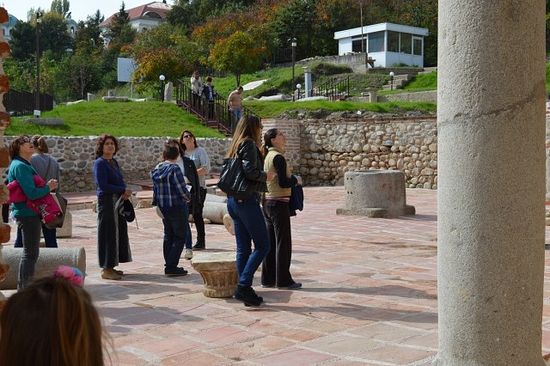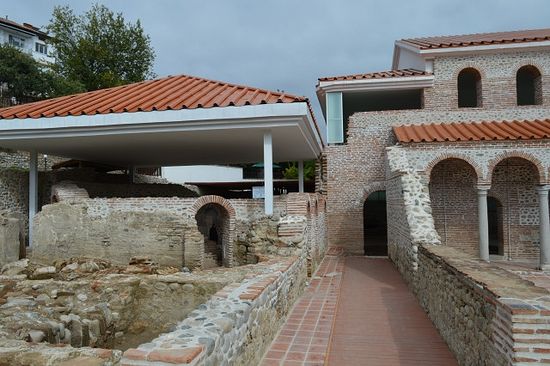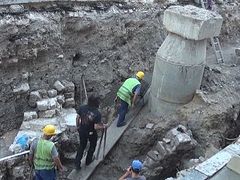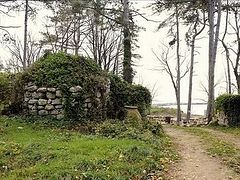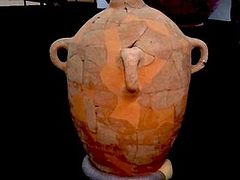Source: Archaeology in Bulgaria
October 19, 2015
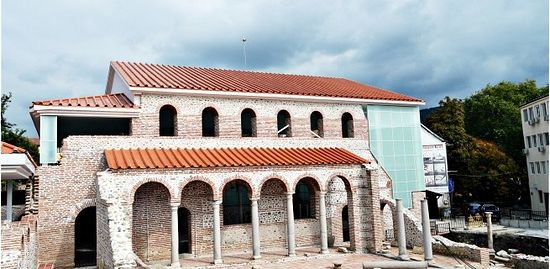 The soon-to-be-opened Archaeological Park in Bulgaria’s Sandanski features two Christian basilicas – the Bishop’s Basilica and Bishop John’s Basilica, a martyrium, and a holy well (a spring of holy water), also known as an “ayazmo”. Photo: Sandanski Municipality
The soon-to-be-opened Archaeological Park in Bulgaria’s Sandanski features two Christian basilicas – the Bishop’s Basilica and Bishop John’s Basilica, a martyrium, and a holy well (a spring of holy water), also known as an “ayazmo”. Photo: Sandanski Municipality
A large number of tourists have visited the soon-to-be-opened Archaeological Park of newly restored Early Christian buildings from the Roman city Parthicopolis in the southwestern Bulgarian town of Sandanski during its Pre-Opening events on October 16-18, 2015.
The Early Christian complex in Sandanski, including two Christian basilicas – the Bishop’s Basilica and Bishop John’s Basilica, a martyrium, and a holy well (a spring of holy water), also known as an “ayazmo” – have been under restoration since 2013 under an EU funded project entitled “Sandanski – the Dawn of Early Christianity”.
The project, which is supposed to provide a boost for cultural tourism in the town of Sandanski, a spa resort located near Bulgaria’s border with Greece, is worth BGN 6.1 million (app. EUR 3.1 million), of which Sandanski Municipality has contributed BGN 160,000 (app. EUR 82,000).
The Pre-Opening events organized by Sandanski Municipality at the Archaeological Park of Early Christian Parthicopolis have attracted the interest of visitors from all ages, the municipal administration has announced.
Sandanski Municipality expects that the Archaeological Park featuring excavated and restored buildings from the Late Antiquity / Late Roman and Early Byzantine period will become a major cultural tourism attraction in Southwest Bulgaria, a region that is also close to Northern Greece and the Republic of Macedonia.
During the Pre-Opening of the new archaeological heritage site in Bulgaria’s Sandanski, the visitors of the Early Christian complex had the opportunity to see the almost perfectly preserved Early Christian baptistery where the residents of Parthicopolis and the region were baptized as Christians in the Late Antiquity.
Sandanski Municipality and the Sandanski Museum of Archaeology are considering the idea ofopening the Early Christian baptistery for modern-day baptism ceremonies.
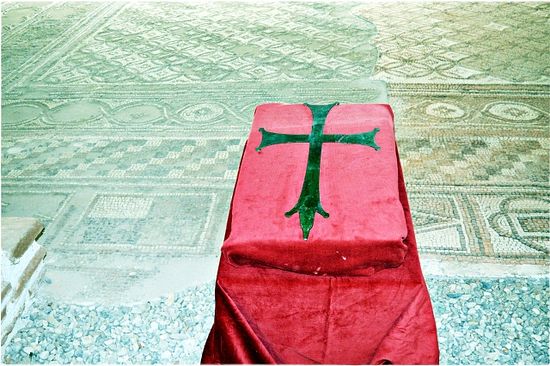 This 5th century AD procession cross carried by the local bishop in the Roman city of Parthicopolis has been discovered during the recent archaeological excavations in Bulgaria’s Sandanski. Photo: Sandanski Municipality
This 5th century AD procession cross carried by the local bishop in the Roman city of Parthicopolis has been discovered during the recent archaeological excavations in Bulgaria’s Sandanski. Photo: Sandanski Municipality
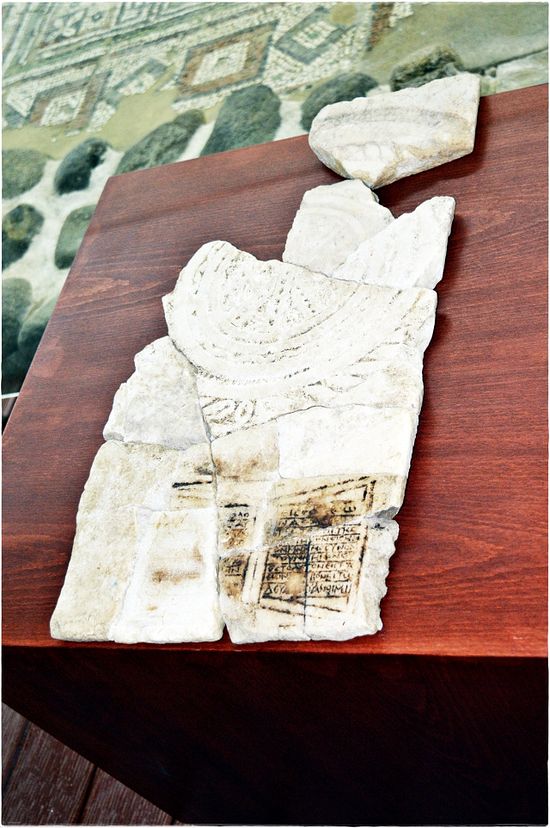 This Early Christian christogram, a Christian symbol consisting of a monogram of letters standing for the name of Jesus Christ, is also one of the most exciting artifacts discovered during the archaeological excavations of Parthicopolis in Bulgaria’s Sandanski. Photo: Sandanski Municipality
This Early Christian christogram, a Christian symbol consisting of a monogram of letters standing for the name of Jesus Christ, is also one of the most exciting artifacts discovered during the archaeological excavations of Parthicopolis in Bulgaria’s Sandanski. Photo: Sandanski Municipality
The Archaeological Park in Sandanski features over 1,000 cultural and archaeological artifacts.
These include the most interesting artifacts of the recent archaeological discoveries from the ancient city of Parthicopolis made as the local archaeologists were working on the further excavation and restoration of the Early Christian complex.
Earlier in August 2015, the archaeologists excavating the so called Bishop’s Basilica of the Ancient Roman and Early Byzantine city of Parthicopolis in Sandanski discovered the last fragment from a marble slab with a christogram, a Christian symbol consisting of a monogram of letters standing for the name of Jesus Christ.
In March 2015, the local archaeologists announced the discovery of the large bronze cross for church procession from the 5th century AD.
In April 2015, the archaeologists in Sandanski found the hand of a huge Roman marble statue while excavating the Early Christian monuments.
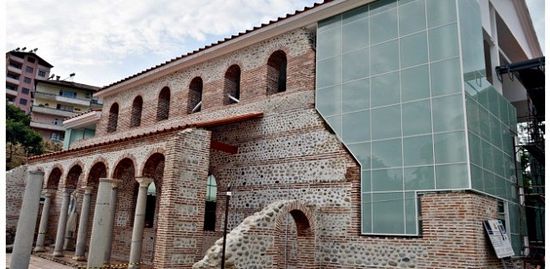 Different views of the Early Christian Archaeological Park in Bulgaria’s Sandanski which has welcomed its first visitors during its Pre-Opening events. Photos: Sandanski Municipality
Different views of the Early Christian Archaeological Park in Bulgaria’s Sandanski which has welcomed its first visitors during its Pre-Opening events. Photos: Sandanski Municipality
Background Infonotes:
Parthicopolis was an Ancient Roman city located in the Roman province of Macedonia; its ruins can be found in the downtown of today’s Sandanski in Southwestern Bulgaria.
It is known to have been an important center of early Christianity, having been located just some 100 km away from the Ancient Greek town of Philippi where Apostle Paul established the first Christian community in Europe.
A testimony for the significance of Parthicopolis as an Early Christian center is the fact that it was mentioned during the Nicaea Council. The town of Parthicopolis was destroyed in barbarian invasions, possibly by the Slavs who tried to capture Thessaloniki in the second half of the 6th century.
The Bishop’s Basilica is the largest of four ancient basilicas found in Parthicopolis, today’sSandanski in Southwestern Bulgaria. It consists of an entire complex of early Christian buildings, and was the seat of a bishopric in the late Antiquity.
It was first discovered in 1989 by Vladimir Petkov, then and current director of the Sandanski Museum of Archaeology, and has been excavated ever since. Towering at 16 m and with a length of 30 m and width of 22 m, the basilica is unique for its Early Christian mosaics and murals, including depictions of fish and birds.
The Bishop’s Basilica must not be confused with Bishop John’s Basilica, which is also one of the four ancient basilicas in Parthicopolis in today’s Sandanski in Southwestern Bulgaria. It is especially known for a mosaic inscription found in the center of its narthex stating that it was built by a “Bishop John”; hence, it has also become famous as Bishop John’s Basilica.
In 2013, the Sandanski Municipality started the partial restoration of the two basilicas, the Bishop’s Basilica and Bishop John’s Basilica, and the Early Christian complex in Parthicopolis with an EU grantof BGN 6.1 million (app. EUR 3.1 million) under Operational Program “Regional Development”. Thebasilicas and the adjacent buildings were destroyed by arson during barbarian invasions, possibly by the Slavs who tried to capture Thessaloniki in the second half of the 6th century.
The Sandanski Museum of Archaeology was founded in 1936, and is one of the five archaeological museums in Bulgaria specializing in ancient archaeology. It is situated over the foundations of Bishop John’s Basilica. Its exhibits feature a unique collection of later Roman marble gravestones and tablets and Early Christian mosaics.

